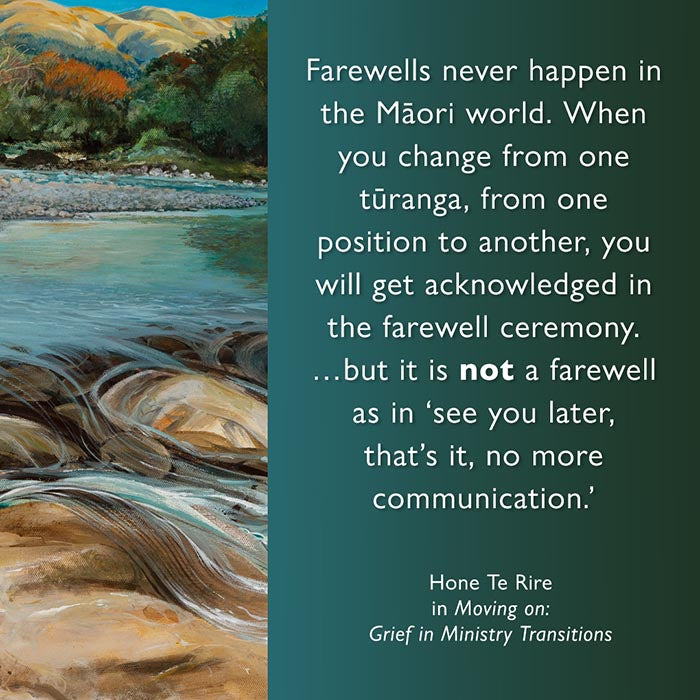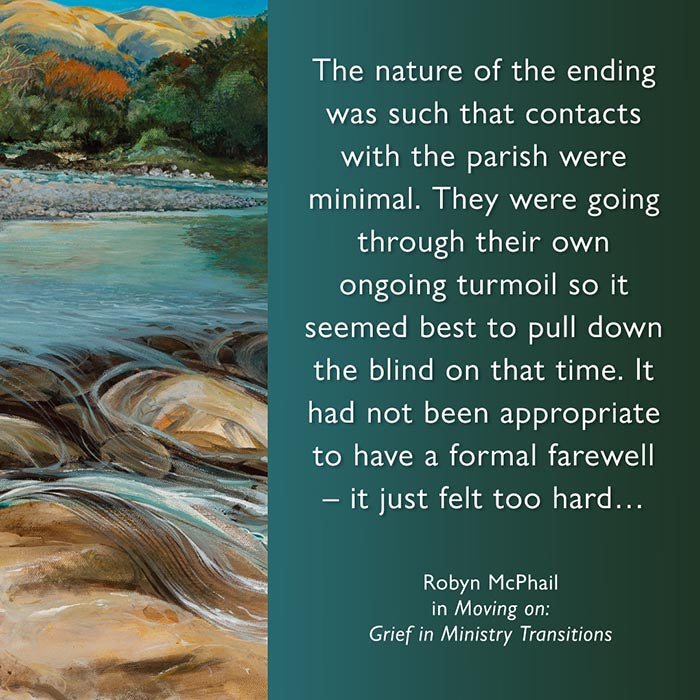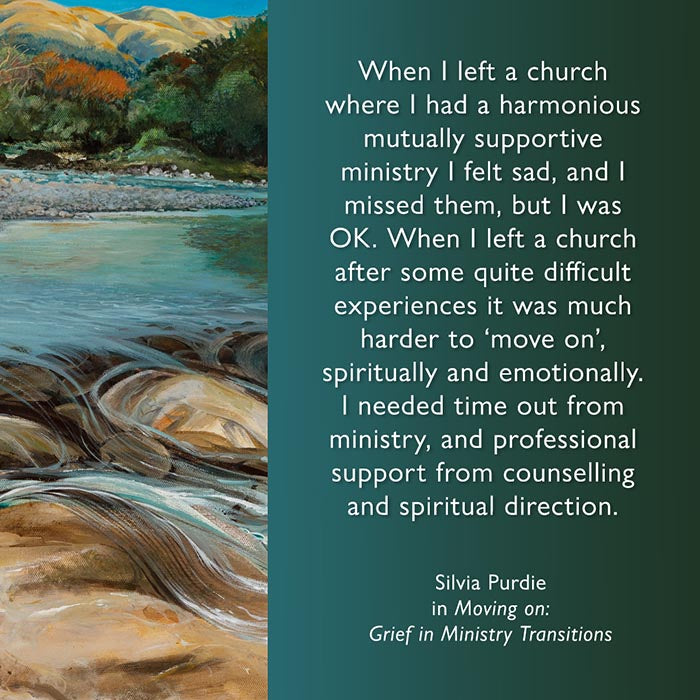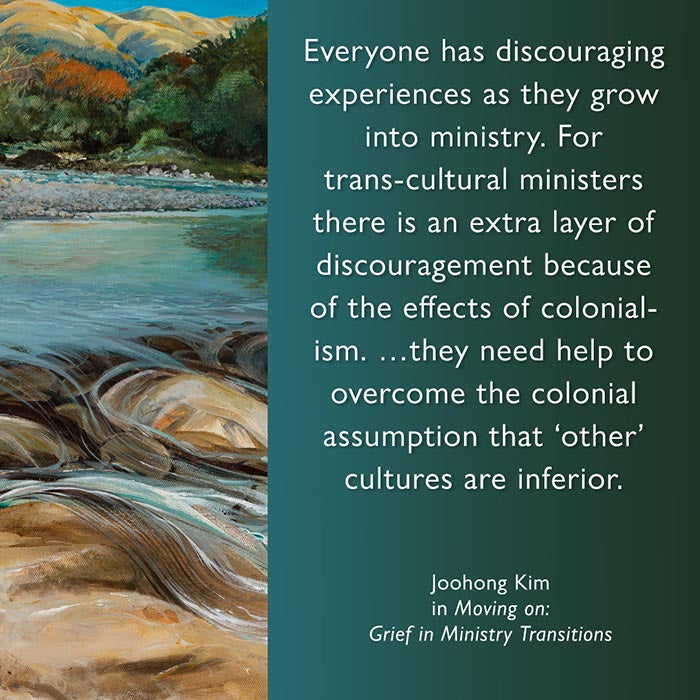Books and resources for ministers, worship leaders, church members and all spiritual people
Philip Garside Books
Moving On - Print.
Moving On - Print.
Couldn't load pickup availability
Moving On: Grief in Ministry Transitions.
Edited by Silvia Purdie
Overseas customers:
Order your print books through your local Amazon store and avoid the high cost of postage from New Zealand:
Amazon.com | Amazon UK | Amazon Aust.
Discover practical guidance and heartfelt narratives that equip ministers and church leaders to navigate the complex journey of grief during ministry transitions with honesty and grace.
This book:
- Offers practical advice for handling ministry endings and transitions.
- Shares personal stories from diverse contributors for real-world insights.
- Explores prayers and liturgies that facilitate healing and reflection.
- Provides insights about church processes and policies related to resignations and retirements.
- Offers tools and resources for supporting grieving congregations.
- Describes personal and communal grief practices in ministry settings.
- Fosters deeper understanding of cross-cultural perspectives on grief.
Features
- Contributions from 40 diverse authors and ministers.
- Sections dedicated to grieving, complicated grief, and recovery.
- Practical tools, tips, and resources for moving forward.
- Inclusion of poetry that enriches the thematic depth.
- Liturgical resources for prayer and reflection.
Soft cover, B/W text, 290pp, 6″ x 9″
ISBN: 9781991027085
Philip Garside Publishing Ltd (2022)
[19 in stock 29 October 2025]
Click for eBooks
Description
Moving On: Grief in Ministry Transitions is an essential resource for ministers and church leaders grappling with the complexities of ministry endings.
This comprehensive volume offers both practical advice and personal stories from nearly 40 contributors, addressing the unique blend of grief and hope that accompanies significant transitions in church life.
Every ending brings a need to rework and re-story relationships, transforming what was into memory. This book guides readers through this process with honesty, providing tools to navigate the emotional landscape of grief while fostering renewal and joy.
Contributors share their experiences, from the pain of leaving a conflicted ministry to the healing found in community and prayer.
Each section delves into themes of grieving endings, complicated grief, and recovery, featuring prayers and liturgies that help facilitate personal and congregational healing.
With a blend of cultural insights and practical resources, Moving On is designed to support not only the individual minister but also the wider church community as they journey through transitions with grace and dignity.
Article about the book
Out the other side:
The unique challenge of endings in ministry
Ministry: International Journal for Pastors,
published by Seventh-day Adventist Church, USA.
www.MinistryMagazine.org
https://share.transistor.fm/s/06fd5fa2
“Ministries end for a host of reasons. Some are positive, a clear, exciting call to a new ministry. Some are expected and well planned, such as retirement. But sadly, many endings are tinged with disappointment and frustration. We love to celebrate God’s call in new beginnings, but seeing God’s hand at work in the leaving can be harder. Some ministry endings are traumatic, like a sudden death, formal discipline, or subtle abuse. These are the hardest points in ministry journeys and threaten to derail ministry callings completely.
It is vital for our own well-being as ministers and for the health of our congregations that we learn to see God at work in endings as well as beginnings. This means attending to grief, the loss and all it means, and supporting one another through the hard times. This article identifies four reasons ministry transition can be uniquely challenging, together with four biblical themes that enable us to grow “out the other side” of endings.
Over the past three years, I have talked to people about endings and transitions, which formed into a book called Moving On: Grief in Ministry Transition.1 It began with my own healing after I resigned from a parish, but as my colleagues shared with me, God called me to continue this work and offer it to the church. Over 50 people contributed to Moving On, a rich cultural and theological diversity. Their stories ring with faith in Christ, crucified and risen, who leads us and walks with us, especially in the places where we struggle to recognize Him.
Multiple loss challenge
Why is ministry transition uniquely challenging? First, because of multiple losses. Ending a ministry involves many losses all at once: friends, a job, an income, and a role with status. When I left my parish, I grieved for my hopes and plans, the goals not yet accomplished, and the things that might fall over without me. Where housing is provided, leaving a position means losing the family home. It can mean changing towns and leaving friends and schools. But the main thing is the loss of our faith community and sense of belonging.
When a minister leaves a position, suddenly support systems such as supervision and ministers’ groups end. I found myself having to take total responsibility for my own recovery, a rapid lesson in self-reliance that would have been made easier by more recognition from my denomination of the challenges of post-ministry grief. There is little curiosity about the experience of ending. Ministers who resign are typically expected to keep silent about the reasons for their resignation. It is a lonely place.
Grief theory names multiple loss as a complicating factor in grief. Too much to deal with can overwhelm our ability to process well. The biblical theme that speaks to this is exile. God’s people knew what it was like to be cast out of their homes. Could they sing the Lord’s song in a strange land (Ps. 137)? John knew exile on Patmos, cut off from the church. But even there, Jesus met him, inspired him, and gave him a new phase of ministry.
The challenge of recovery is twofold: honesty and rest. Psalms and Lamentations invite us to pour out all the truth of how we feel before God. Hold nothing back. Yes, count your blessings, but also count the cost. What have you lost? What have your spouse and your kids lost? Which relationships do you miss the most?
And rest. After a death, we know that people must rest, but after a ministry ends, we expect our leaders to rush straight into the next one. No wonder we feel tired. Take time, make time, somehow, to allow the Holy Spirit to heal and restore. Churches, give ministers a holiday between appointments.
Relationship challenge
The second challenge is a tricky one. According to grief theorist William Worden, “the type of relationship that most frequently hinders people from adequately grieving is the highly ambivalent one with unexpressed hostility.” The more complicated your relationship with the person who has died, the more complicated your grieving for them will be. The same applies to churches. On the face of it, leaving a conflicted ministry is a relief, but years later, pastors still struggle to forgive and be at peace.
Pastoral relationships can be complex and ambivalent. As a parish minister, I was a leader and friend, surrogate daughter, aunt, and celebrant at the same time. Like it or not, I represented God and the Presbyterian Church. No other professional role is so multi-layered, which is a wonderful giving of ourselves, but it has a unique capacity for rejection that causes pain.
Jesus’ parable of the wheat and the weeds (Matt. 13:24–30) helps with this. “Let the weeds and the wheat grow together,” the landowner said (v. 30, ERV). Jesus had plenty of experience of both the good and the bad, the ambivalence of human relationships and the dark side of good intentions. This parable teaches me not to get too stressed about broken promises, divided loyalties, hard hearts, and refusal to change. We can let go of our expectations of how we “should” have been treated. We can and must forgive those who have hurt us. We might even come to see, as Jesus does, the weeds in ourselves as well as in others. In God’s hands, the brokenness of human life, including church life, will dissolve away, leaving only what endures: faith, hope, and love (1 Cor. 13:13).
The circumstances challenge
The third factor is that the more stressful the ending of the ministry, the more time and energy is needed for recovery. Perhaps the most traumatic experience in ministry is “forced exit.” Some parishes close or can no longer afford a stipend. Ministers can violate ethical standards, and as a result, the church cuts the pastoral tie. Some ministers resign due to illness. And some pastors end up feeling as though they have no choice but to resign. Many have experienced bullying or abuse. To leave a ministry under circumstances not of your own choosing or of feeling mistreated leaves a strange intensity of grief for that ministry. It’s a wound in the soul.
The biblical word that powerfully resonates with trauma is crushed. In the Old Testament, crushed means total defeat, as in David’s song of victory in 2 Samuel 22:38 (NIV); the soldiers of Israel either are celebrating the crushing of their enemies or are themselves defeated. Crushing is also the process by which wheat becomes bread, olives become oil, and grain is offered as a sacrifice on God’s altar (Lev. 2:14). Isaiah prophesies the coming Messiah who will be “crushed for our iniquities” (Isa. 53:5, NIV) but “will not . . . be crushed until He has established justice in the earth” (Isa. 42:4, NRSV). In 2 Corinthians, Paul describes himself and his friends as being crushed to the point of despair by an attack (2 Cor. 1:8), and yet he goes on to declare, “We are afflicted in every way, but not crushed” (2 Cor. 4:8, NRSV).
This paradox of being crushed and yet not crushed is central to the Christian experience of trauma. The metaphor of crushing reveals God’s process of transforming people, like grains of wheat become flour, which becomes bread, which becomes the body of Christ, which was broken for us in the greatest act of love. This is a circularity in which human pain is matched and held within Christ’s suffering. The work of grieving in the aftermath of trauma, informed by the Christian faith, is a work of willing sacrifice to unwelcome suffering, surrendered into a power made perfect in weakness.
The call challenge
Last but not least, ministry transition can involve a crisis of calling. When I was inducted into a parish, I felt strongly that I was called by God, there and then, to that place and those people. I was determined to be resilient and stay the course. To come to the point of resigning from a ministry confronts core assumptions of identity and trust in a God who saves, empowers, and protects. Feeling undermined and unwell is a faith crisis. Grief theory describes this as an existential component of grieving. Psychologist Ronnie Janoff-Bulman highlights how our deep assumptions can be challenged by loss. Are we safe in the world? Is life meaningful? Is it fair? She points out, “It is those with the most positive pre-existing assumptions whose core schema are most deeply violated.” The church claims to be a safe place of belonging, family, meaning, and justice. When our experience contradicts that, we experience profound grief.
Our theology of call may or may not serve us well. One of the contributors in Moving On: Grief in Ministry Transition describes months of struggling with “but I thought I was called.” Another contributor challenges pastors to allow their understanding of the call to break open and expand. My own experience was that, through this process, God both affirmed my call to ordained ministry and opened it in directions I could never have predicted.
The spiritual work of re-evaluating calling and career leads us on a path of surrender and resurrection. We find ourselves walking the road to Emmaus while a stranger tells a story of suffering and healing. We recognize Jesus right beside us as, eventually, we find our place in His dynamic plan for the salvation of the world.
As ministers, our stories include the pain of ending and the joy of new beginnings. The space in-between can be an uncomfortable one, even traumatic, and is often walked alone. Coming “out the other side” of transition requires support, including professional help as well as rest and recovery. Prayer is vital to stay connected to God even when we are cut off from the faith community. Scripture overflows with resources to help us, for we learn that God’s people were in transition more than they were settled, and God met them there.
It is my prayer that those in ministry will find greater healing for past pain and fresh energy for the work of mission. I would love for ministry endings to be done with grace so that those who go and those who stay are blessed and able to “farewell” with peace. “
References
Silvia Purdie, ed., Moving On: Grief in Ministry Transitions (Wellington, New Zealand: Philip Garside, 2022). The book discusses endings and transitions, with resources for prayer and liturgy as well as career counselling, supervision, and support.
William Worden, Grief Counselling and Grief Therapy: A Handbook for the Mental Health Practitioner, 4th ed. (Abingdon, UK: Routledge, 2010), 127.
Henry Krystal, “Shattered Assumptions: Towards a New Psychology of Trauma,” Journal of Nervous and Mental Disease 181, no. 3 (March 1993): 208, 209.
Reviews and Reviewer's Comments
Review by Rev. Dr Karen Kemp:
Centre for Church Leadership Senior Coach / Lecturer School of Theology, Laidlaw College, New Zealand,
in UK Journal of Practical Theology – April 2024
“Silvia Purdie’s book is a timely contribution to those ministering in post-COVID times. Her artful weaving of interviewees’ stories, poems, prayers, and research crafts a ‘basket’ fit to hold the emotions, spiritual, psychological and physical challenges, personal and communal impacts, and practicalities inherent in ministry transitions.
This book is presented in five sections designed to be dipped into without needing to read it in sequence.
- Section One looks at endings and changes in ministry through a grief lens and offers much needed perspective on how the grief process plays out.
- Section Two examines complicated grief in ministry transitions – including those times when the change is externally imposed and traumatic.
- Section Three offers stories of recovery – of how to journey through to a new place – physically, emotionally and spiritually.
- Section Four focuses on the inner journey of praying goodbyes and includes poems, psalms, songs, and liturgies for grieving.
- Section Five furnishes a well-stocked and very useful toolkit that attends to the practicalities of transitions in individual, organizational, and communal dimensions of ministry. Here, questions around how to navigate farewell gifts and communicate departure sit alongside the need to seek coaching and supervision, and to untether pastoral ties.
Each section draws on the grounded wisdom of seasoned ministers: bringing theory and experience together in ways that deepen understanding, and open paths to walk on even in apparently dead-end situations.
Moving On reflects its Pacific context yet makes a significant contribution to understanding intercultural dimensions of ministry transitions, regardless of location. Throughout, personal stories express the breadth of culture, ethnicity, and ecclesiology in Aotearoa New Zealand and candidly tap into universal themes of identity and vocation, home and belonging, community and relational entanglements so common in ministry.
Scholars and theologians will likely be left hungry for a ‘thicker’ treatment of these themes from a Biblical and theological perspective. Nevertheless, scripture finds voice in poems, songs, and liturgies that name the realities of transition, grief, and loss, yet engender hope and the possibility of new beginnings.
Here is deep, hard won, hope-filled wisdom that is accessible, realistic, and practical. It is reassurance for those who are in the midst of transition - others have navigated this terrain and emerged richer for it. Moving On is above all a timely contribution to the training and sustaining of all who minister in these changing times.”
• • •
“A fascinating and insightful book about ministry transitions. Silvia has skilfully woven together our human stories with the big story of our Christian faith.” Rev. Rose Luxford, Moderator Designate, Presbyterian Church of Aotearoa New Zealand
“Moving On is an eminently practical, honest and theoretically sound book that is so topical for today. Many people will enjoy its relevance. It is impressive in the breadth of viewpoints presented. Best of all, it is very readable!” Rev. John Hornblow, ex-Deputy Mayor of Palmerston North
“What a taonga this book is! Artful weaving of stories, poems, prayers, and research crafts a kete fit to hold the emotions, challenges and impacts inherent in ministry transitions.
Scripture finds voice in poems and liturgies that name the realities of transition and loss, yet engender hope and the possibility of new beginnings.
Here is deep, hard won, hope-filled practical wisdom. Moving On is a timely contribution for all who minister in these changing times.” Rev. Dr. Karen Kemp, Senior Coach/Lecturer Laidlaw College – Te Wānanga Amorangi
“I commend this book as a ministry in its own right – a service for God’s servants so that we may transition better. A treasury of wisdom and a toolbox of liturgical resources.” + Peter Carrell, Anglican Bishop of Christchurch
“In this comprehensive overview of ministry endings Silvia Purdie very helpfully addresses the grief and pain experienced by many.” Murray Robertson, Pastor Emeritus, South West Baptist Church, Christchurch.
About the author
Rev. Silvia Purdie brings extensive leadership experience to this work of pastoral theology.
An ordained minister of the Presbyterian Church of Aotearoa New Zealand with a background in youth and family ministry, she is also a counsellor, professional supervisor and consultant.
Her other books are Let’s Say a Psalm and Awhi Mai Awhi Atu: Women in Creation Care
Contents & Contributors
- Foreword – Maja Whitaker
Introductions
- Grief in Ministry Transitions
- Layers: a Cross-Cultural Conversation
- This Heart – Ana Lisa de Jong
- My starting point
- Tough Honesty
- Dedications
- A Theology of Transition – Alistair Mackenzie
- Transition – Ana Lisa de Jong
Section One: Grieving Endings and Changes in Ministry
The Tasks of Grief
- To fully decide to leave
- To end many relationships and renegotiate a few
- To work through the pain of grief
- To tell a grace story of that ministry
- To reinvest in a new ministry
- The Work of Grief – Ana Lisa de Jong
- Fire, Cloud and Calling – Fakaofo Kaio
- Your Loss is Our Loss – Tokerau Joseph
- Never Forgotten: Death in Active Ministry – Caroline Mareko Uili Teó
- Mana Fa’ailo Leasi-Paese
- Internally Displaced: a Spouse’s Perspective – Jenny Flett
- A Lay Leaders’ Perspective – Alan and Elizabeth Purdie
- Farewells Never Happen – Hone Te Rire
- A Journey with Endings and New Beginnings – Robyn McPhail
- Rejection and Colonial Mentality – Joohong Kim
- Am I Doing the Right Thing? – Henry Mbambo
- Jesus, Man of SorrowsI Cried – Ana Lisa de Jong
Section Two: Complicated Grief in Ministry Transitions
- Exile: Multiple Loss
- I Will Sing the Songs of Zion – Henry Mbambo
- The Wheat and the Weeds: Ambivalent Attachment
- A Friend But Not a Friend
- Forced Exit: Trauma
- Faamagaloga: Forgiveness – Mua and Linda Strickson-Pua
- Grieving Alone: Disenfranchised Grief
- That Sense of Being Alone – Don Hall
- Crisis of Calling: Meaning and Purpose
- I Thought I Was Called – Jill Kayser
- Long Shadows – Ana Lisa de Long
Section Three: Recovery
The Only Way Out is Through
- Rest
- Own it
- Surrender
- Get in the Flow
- Work it Out
- Grief and Gratitude in Two Hands – Lynne Baab
- Is Your Concept of Ministry Restricting? – Elsa McInnes
- We Want to Hear Your Voice – Hone Te Rire
- For All That Has Been – Alister Hendery
- Unravelling and Re-ravelling – Steve Taylor
- Heart Song – Ana Lisa de Jong
- The Remains of the Day – Ana Lisa de Jong
- Being Well: Mission, Trauma and Healing – Sarah Beisly
On the Mat: Grief and Ministry in the Samoan Church – Fele Nokise
- Ministry and Authority
- When a minister dies
- Pain and Faith
- Practical Suggestions
- Mat Theology
- How Good – Ana Lisa de Jong
Section Four: Praying Goodbye
Liturgies for Grieving
A Process of Healing: Joyce Rupp
- Prayer of One Going with Gratitude
- Prayer of One Forced to Leave
- Prayer of One in Exile
- Prayer of One Who Feels Crushed
- Prayer of One Changing Roles
- Prayer for Moving from Complaint to Trust
- Praying Goodbye with Children
- Blessing of Closure When Leaving a Congregation or Group: Mary Nilsen
Songs for Endings
- As You Go On Your Way – John Ylvisaker (song)
- Holy Spirit, ever seeking – Colin Gibson (song)
- May the God of Peace – Jules Riding and Silvia Purdie (song)
- The Peace Song – Silvia Purdie (song)
- Blessing Song List
Poems and Psalms by Silvia Purdie
- Tipped out
- My question on pain
- Trauma and Recovery
- Psalm 20: “The Answer to My Call”
- Psalm 42: “As the deer longs”
- Psalm 70:14: “Hope Continually”
- A Theology of Ending
Life Calls For Lament – Malcolm Gordon
- Lament: a prayer to God when we cannot find God – Malcolm Gordon
- Inside Out – Ana Lisa de Jong
- Except a Grain of Wheat – Ana Lisa de Jong
Section Five: Tools for Moving On
Leaving Well: 10 Tips
- What to Say and What Not to Say
- Rules for communicating when you are leaving
- Practical Pointers – Andy Piggott
- The Role of Presbytery – Steve Jourdain
- Releasing the Pastoral Tie – David Coster
- The Key Role of Church Elders
- Grieving Congregations and Church Decline – John Daniel
- From the Centre to the Edge – Susan Blaikie
- Our ‘Vacancy’ Model is Broken – Richard Dawson
- Managing Staff Transitions – Richard Dawson
- Youth Ministry Transitions – Nga Rolston and Gordon Fitch
- God Goes and God Stays: Children and Change – Robin Humphreys
- Farewell Gifts
- Career Coaching – Josiane McGregor
- Debrief and Re-brief – Rachel and Damon Fitzpatrick
- Journaling as a Grief Practice – Henry Mbambo
- A Bridge from Here to There – John Hornblow
Supervision and ‘Space for Grace’ – John Daniel
- Supervision Process
- Companionship
- Anger
- Ethics
- Preparing for Retirement – David Coster
- A Retiring Offering – Margaret Garland
- A Happy Ending – Anne Thomson
- The Risk – Ana Lisa de Jong
Moving On: A Conclusion
- Book List
- Ana Lisa and her Poems












